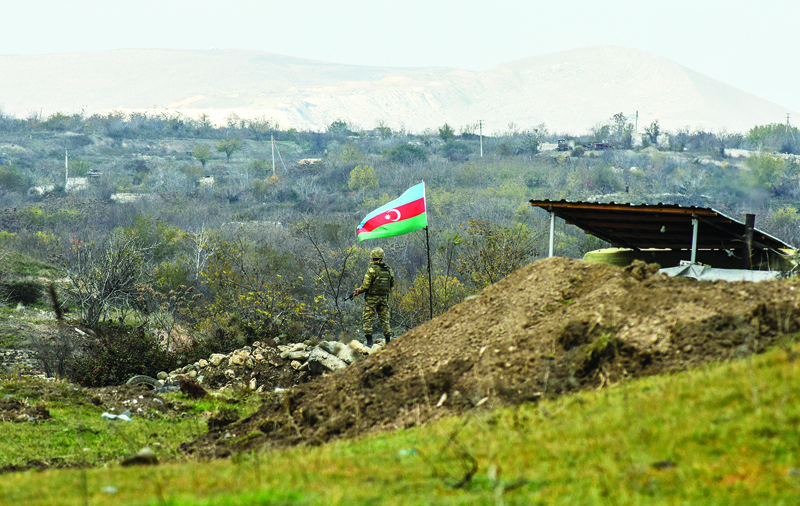
BAKU: Azerbaijan said yesterday that nearly 2,800 of its soldiers were killed in recent fighting over Nagorno-Karabakh, the first details it has released of military losses in weeks of clashes with Armenian forces. The defense ministry in Baku said in a statement that "2,783 servicemen of the Azerbaijani armed forces were killed in the patriotic war," adding that the identity of 103 troops is yet to be established though DNA analysis. One hundred more Azerbaijani soldiers are missing, the statement said.
Azerbaijani soldiers "showed courage and heroism in the Great Patriotic War and inflicted crushing blows on the Armenian armed forces," it said. Yerevan had earlier announced that 2,317 Armenian troops died during the conflict, which also claimed the lives of at least 93 Azerbaijani and 50 Armenian civilians.
Up to 90,000 people-some 60 percent of the population-fled the disputed Karabakh region during the fighting. Fresh clashes erupted between Armenia and Azerbaijan in late September, rekindling the Caucasus neighbors' decades-long conflict over the ethnic Armenian enclave of Azerbaijan.
Fierce fighting persisted for six weeks despite efforts by France, Russia and the United States to broker ceasefires, before Armenia and Azerbaijan signed a Moscow-brokered peace deal on November 9. The agreement was signed after Baku's army overwhelmed separatist forces and threatened to advance on Karabakh's main city Stepanakert. It has sparked celebrations in Azerbaijan and fury in Armenia, where Prime Minister Nikol Pashinyan is facing mounting criticism for agreeing on the deal.
Under the agreement-which leaves Karabakh's future political status in limbo-Armenia lost control of parts of the enclave as well as seven adjacent districts that it seized during the 1990s war. Yerevan has thus lost territories it had hoped to use as a bargaining chip to pressure Baku towards the recognition of Karabakh's independence. Nearly 2,000 Russian peacekeepers have deployed between the two sides and along the Lachin corridor, a 60-kilometre (35-mile) route through the district that connects Stepanakert to Armenia. Karabakh broke away from Baku in a war in the early 1990s that left some 30,000 people dead and displaced tens of thousands of Azerbaijanis.
Turkish President Recep Tayyip Erdogan will visit staunch ally Azerbaijan on December 9 and 10, his office said yesterday, following a truce that ended fighting over the disputed Nagorno-Karabakh region. The planned visit is the first by a foreign head of state to Baku since the ceasefire last month, which ended six weeks of heavy fighting and saw ethnic Armenians agree to withdraw from large parts of the contested region of Azerbaijan.
Turkey is a regional ally of Azerbaijan and has fervently defended its right to reclaim the Nagorno-Karabakh lands that Baku lost to ethnic Armenian separatists in a 1988-94 war. While the presidency did not provide details of the visit, Erdogan is expected to meet with his Azerbaijani counterpart Ilham Aliyev.
Erdogan will also attend a major military parade in Baku next Thursday when the "Karabakh victory" will be celebrated, Turkish media reported. Ankara announced on Tuesday that Turkey and Russia have agreed to monitor the Karabakh truce from a joint peacekeeping center. Last month, the Turkish parliament voted to deploy a mission to set up the center with Russia. Turkish officials have said the center will be established in an area to be designated by Azerbaijan. Moscow has stressed repeatedly that Turkey should have no troops on the ground. - AFP










